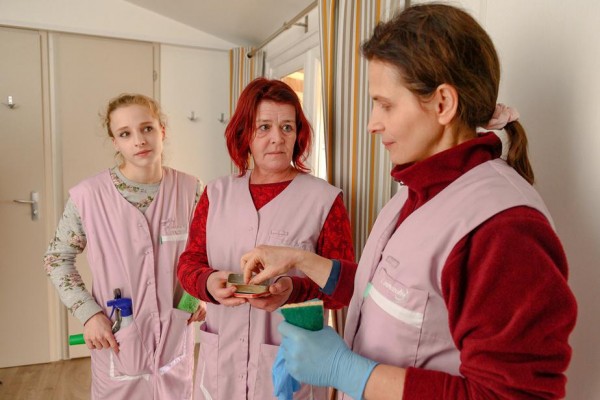 The wrong point of view
The wrong point of viewIn
Between Two Worlds (original title
Ouistreham) director Emmanuel Carrère has adapted Florence Aubenas' book
Le Quai de Ouistreham, a bestseller describing the author's experience during some months undercover sampling the effects of the 2008 economic crash on a minimum wage temp worker in have-not France. It's something like the longtime work of American social commentator Barbara Ehrenreich, whose signature book is
Nickel and Dimed: On (Not) Getting By in America (see
Wikipedia) , and it's a process that goes back to George Orwell's
Down and Out in Paris and London. Aubenas left Paris for the northern city of Caen and put herself on the temp labor market, posing as a divorced woman down on her luck. She wound up working as a cleaner on the Ouistreham ferry and her book was the result.
Many non-actors are used in the film for the other ferry workers, creating an authentic effect. The part of the writer, however, here renamed Marianne Winckler, is played by Juliette Binoche.
This throws everything off because Binoche, even stripped of nice clothes and makeup, is a world-famous actress. The real life Binoche couldn't have posed as a penniless divorce for a minute - or not for very long anyway. But worse, while the book, like Ehrenpreis', like Orwell's, is on the underdog,
Between Two Worlds is about the poseur - and on the poseur posing as the poseur. The focus is constantly on the feat of going undercover - not that the French author is in danger of being recognized, but that her pose as someone she isn't, without money or resources, will be. On top of this is our awarenes that this is a famous actress playing her. The attention that ought to be on class, on wages, on working conditions, though it is there at times, is constantly shifting back to the celebrity actress and the precarious deception of the character she's playing.
Something feels wrong about this film from the start and indeed the film is very aware of that. Marianne is lying to everyone (and at least once early on she gets found out). The most painful thing is that she bonds closely with a sensitive younger coworker on the ferry, Chrystèle (excellent newcomer Hélène Lambert), and the most memorable moments of the movie in purely human terms - rather than purely sociological ones - are the times of fun and intimacy and friendship between Marianne and Chrystèle. It's the same kind of betrayal that happens when a spy goes into deep cover in the world of espionage. What can be worse than to bond deeply with a friend when it's all a lie?
That is inevitable with what the writer was doing to gather her information - though she could have kept more of a distance - in fact Marianne's increasingly intimate friend-times are a grievous error of judgment that probably didn't happen to the real author, since they are all invented for the film and not in the book. Certainly none of this was the main point of Aubenas' book as it is here. The movie focuses on the tension: if, or more likely when, Marianne is going to be found out, and her painful feelings when Chrystèle discovers her friendship has been betrayed and is deeply alienated, hurt, and angered.
Sure, this is interesting: there's a moral dilemma. It's a tradeoff, lyihg and deception to achieve arguably a greater "truth," an understanding, by us, the "haves," of what it's like for the brutally exploited, mostly female, workers on the ferry - though we never really see the dirt. The vomit and shit the women mopping the toilets talk about is kept politely out of sight.
The scenes of Chrystèle and her kids at the beach with Marianne, the bonding, the good times, the sweetiness, are a touching little portrait of friendship. Marianne is
trying to be authentic; only she's not, because she's not who she says she is. Maybe this relationship would have been less immoral if she had told Chrystèle the truth as soon as they started getting close. But that would have risked the book project, and the book project always came first. This is proven after the book is out, many of the coworkers have come and been accepting and gotten their signed coppies, and Chrystèle instead holds back and sends for Marianne, and tries to make come to clean the ferry alongside her one more time to show she is her friend, and Marianne refuses.
All this, I understand, is invented for the movie and not part of the book. The movie has run away with the focus on the celebrity actress, on the undercover writer she's playing, and on the uncomfortable feelings of betraying a friendship. Interesting, no doubt, but a complete betrayal of the theme of the book source - the reason why this story exists. This whole film is a grievous mistake, and betrays the numerous non-actors who make such a good contribution to showing what work for the exploited French working class is like.
BetweenTwoWorlds/Ouistreham, 106 mins., debuted July 7, 2021 at Cannes (Directors' Fortnight); many, many other international festivals. Shown Mar. 5, 2022 at the Rendez-Vous with French Cinema, New York. Limited US theatrical release starting August 11, 2023(limited). Watched on an online screener from distributer Bright Iris Film Co.
Metacritic rating: 60%.





